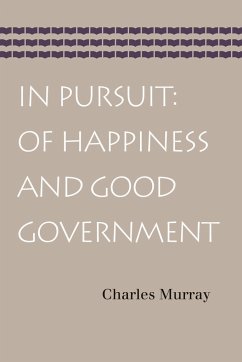Respected author, scholar, and columnist Charles Murray has long challenged accepted notions of public and social policy issues. In this volume, originally published in 1988, Murray presents a persuasive and practical argument that reconsiders commonly held beliefs of what constitutes success in social policy by examining the scope of government and its role in people's pursuit of happiness. In Pursuit begins by examining James Madison's statement: "a good government implies two things; first, fidelity to the object of government, which is the happiness of the people; secondly, a knowledge of the means by which that object can best be attained." Murray exhibits a thoughtful, accessible writing style as he considers such basic, important questions as whether individual efforts or government reform should be responsible for dealing with society's problems. Drawing from his minimalist-government viewpoint, Murray proposes that government not try to force happiness on the people with federal policies or programs but, rather, that it provide conditions that enable people to pursue happiness on their own. Murray also proposes that the pursuit of happiness be used as a framework for analysing the efficacy of public policy, and he comes to the conclusion that Jeffersonian democracy is still the best way to run society, even in today's complex society. The author states, "Jefferson and his colleagues were right more universally than they knew. In particular, they understood that the vitality of communities and the freedom of individuals are intertwined, not competitive".
Hinweis: Dieser Artikel kann nur an eine deutsche Lieferadresse ausgeliefert werden.
Hinweis: Dieser Artikel kann nur an eine deutsche Lieferadresse ausgeliefert werden.








